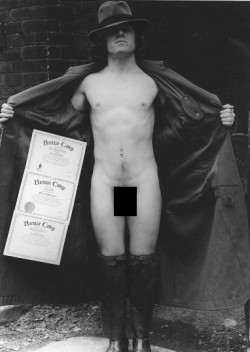 Zuck the suck has a lot to learn about being cool and hip.
Zuck the suck has a lot to learn about being cool and hip.
Last week Mr. Social proved that neither he nor his little Facebook site have an inkling of hippness away from the Starbuck’s universe, when they decided a historical photograph from counter cultural Toronto, taken in the late 60s or early 70s, was nothing but unacceptable nudity, or worse, porno.
Then again, I could be wrong. This could merely be a case of a computer algorithm with penis envy.
The photograph in question was originally used as a sort of anti-advertisement for Rochdale College, a chartered Canadian free school that closed in 1975. In it’s day, Rochdale occupied a brand spanking new eighteen story building near downtown Toronto, bought and paid-for with government funds. Outside of Toronto, this building and the school it housed was one of hippiedom’s best kept secrets. If the 60s counter culture had a Vatican, it was Rochdale.
Now, we’re not going to get into the cool factor that was Rochdale–that’s another article entirely, if not a book. Let’s just say that it was hated by the local authorities because it was a lot like Alice’s Restaurant (where you could “get anything you want”) except on a much grander scale. But it was also legitimately a center of higher education–a free school that spawned some organizations that became mainstays of Canadian culture. Examples of this would include Theatre Passe Muraille, which began in Rochdale and continues to this day as a driving force in Canadian theater; Coach House Press, for a long time the country’s most prestigious artisan printing establishment; and Reg Hartt’s Cineforum.
Indeed, Rochdale was the brain child of Canadian writer and Toronto’s first Poet Laureate, Dennis Lee, who also co-founded House of Anansi Press. To be fair to Mr. Lee, who evidently was not much of an anarchist, Rochdale didn’t turn out quite like he envisioned and it’s doubtful he has fond memories of the place. However, some other writers were very comfortable there, most notably science fiction writer Judith Merril, who moved into the building almost immediately after moving to Canada from her native U.S. as a protest against the war in Vietnam.
Needless to say, running an eighteen story building was an expensive proposition–especially when you consider that the Canadian Mortgage and Housing Authority (CMHC) was always threatening to foreclose if the mortgage wasn’t paid (eventually they did). Enough rents were collected to cover some of the expenses–but not nearly enough to keep the place afloat–so other avenues of funding were explored.
One of the most famous ways Rochdale raised money was through the sale of degrees. Rochdale was an officially chartered educational institution. However, it was not accredited. In other words, Rochdale could legally operate as an educational institution, but an education there would not be recognized by the likes of big universities like the University of Toronto, which was located practically next door. It was a free school. What you learned at Rochdale was for your own edification, because credits from the place couldn’t even be transferred to McDonald’s Hamburger U.
But Rochdale could sell degrees, which they did to raise money. They were fine degrees, featuring high quality hand printing by the masters at Coach House Press. You could buy a Bachelor’s, a Master’s or a PhD. If you wanted to be subversive, or maybe a little more truthful, you could buy a non-degree–again a non-Bachelor’s, a non-Master’s or a non-PhD. In addition to money (they started at $25), some degrees required you to answer a question and others required you to ask a question. On the most expensive degrees, according to the brochure, “no question will be asked.”
In other words, this was subversive hippiedom at it’s best.

As the Rochdale brochure used to say, “Support higher education–buy a degree.”
A few weeks ago David Witton posted a copy of this famous photograph on a Rochdale Facebook group that’s frequented by Rochdale alumni. This led to a lot of discussion about the old days and about their friend “Bobby” Nasmith, with some good natured comments on his physical attributes.
Then Zuckerberg’s nannies at Facebook found it and took it down, scolding Mr. Witton and giving him warning to not do that again. “I had to change my password,” Witton explained in an email, “the implication being maybe someone hacked into my account and did this foul deed, but otherwise I got off with a warning.”
According to Witton, Facebook explained their reasoning thusly:
“Facebook has a strict policy against the sharing of pornographic content and any explicitly sexual content where a minor is involved. We also impose limitations on the display of nudity. We aspire to respect people’s right to share content of personal importance, whether those are photos of a sculpture like Michelangelo’s David or family photos of a child breastfeeding.”
Now, I would’ve thought this picture would fall under the “Michelangelo’s David” clause of exceptions. Witton, evidently a fair man, theorizes: “They may have seen Bob’s pic as making fun of ‘flashing,’ which I’m sure they consider a sexual perversion.”
While it’s nice to know that Facebook wants to protect us from the boogeymen and women in this world–their enforcement seems to be quite selective. While they’re offended enough by this display of an example of 1960s subversive commercial art to remove it, they’re perfectly happy with the photos posted by a user with an account under the unlikely name Roop See (click and scroll down the wall a bit to see).
Maybe Zuckerberg is just one of those people who doesn’t know art but he knows what he likes. As for me, I do know a little about art (or think I do) and this old hippie advertisement qualifies as far as I’m concerned. Indeed, I think I’ll post it on my Facebook page. Care to join me?
Editor’s note: This article was originally published on our sister site If This Be Treason, where you can find a completely uncensored version of the “Support Higher Education, Buy A Degree” photograph.
Christine Hall has been a journalist since 1971. In 2001, she began writing a weekly consumer computer column and started covering Linux and FOSS in 2002 after making the switch to GNU/Linux. Follow her on Twitter: @BrideOfLinux












Someone reported it, that’s how fb became aware of it…
No one gay…